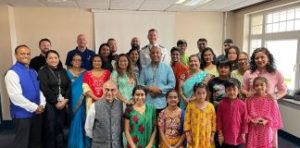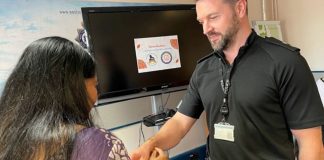In a time when relationships often break faster than they’re built, when family dinners are replaced by busy calendars and text messages, and when isolation quietly grows behind screens, a small cotton thread, a Rakhi, reminds us of something far deeper: our bonds with one another matter.
You don’t have to be Hindu to feel the truth of that.
Next week, as part of Raksha Bandhan celebrations, members of Hindu, Sikh, and Jain communities will gather with police officers and civic leaders at Elland Road Police Station in Leeds. They’ll tie colourful threads around the wrists of police officers and emergency service workers not just as a cultural ritual, but as a gesture of gratitude, respect, and shared humanity. The event, organised by the West Yorkshire Hindu Police Association and the HSS (UK), is a reminder that community isn’t something abstract. It’s something we build, actively, with kindness, care, and participation.
“For me, as I’ve grown older, Raksha Bandhan means much more than just the sibling bond,” says Paresh Mistry, a long-time volunteer with HSS (UK) in Bradford. “It’s become about making time for the people I care about even if we’re far apart, and reminding myself not to take those relationships for granted.”

Raksha Bandhan, which literally means “the bond of protection,” is rooted in the traditional act of a sister tying a Rakhi on her brother’s wrist, a symbolic promise of care and protection. But in recent years, especially in the diaspora, its meaning has broadened. Today, it’s about honouring all relationships built on trust, whether between family members, friends, neighbours, or even public servants who protect our communities every day. Rakhis are now tied not only by sisters, but by anyone wishing to express appreciation and commitment to others, a message that cuts across religion, gender, and background.
The act of tying a Rakhi on a police officer’s wrist, for example, is not just symbolic. It’s a mutual acknowledgement. “We’re saying to the emergency services: we respect you, we thank you for protecting us,” says Paresh. “But in return, we as citizens have a responsibility too to be good, kind, law-abiding, helpful members of our community. That’s Raksha Bandhan in action.”
That spirit of service and mutual respect is embedded in the work of HSS (UK), which runs more than 100 weekly community branches across the country, engaging youth and families in activities focused on character, culture, and citizenship. Through these gatherings, values such as humility, selflessness, and togetherness are taught not just in words, but through lived experience.
“We teach the value of sewa, selfless service,” Paresh explains. “Sometimes that means organising help for the homeless or raising money for charity. But often, it’s just the little things. Helping a neighbour with their shopping. Checking in on someone. Small kindnesses go a long way.”
For many, those lessons come to life during Raksha Bandhan. At past events, young children, some just five or six, have tied Rakhis to senior police officers. “They’re always really touched,” Paresh recalls. “And for that child, it becomes a powerful memory. It teaches them they have a role to play in their community that even small acts matter.”
That sentiment is shared by Kajal Patel, 30, Joint General Secretary of Hindu Swayamsevak Sangh (UK) in Bradford. For her, Raksha Bandhan has grown from a personal ritual with her brother into something much wider. “It’s not just about individual relationships anymore,” she says. “It’s about social responsibility, the Rakhi becomes a symbol of the bond between people and society.”
She sees the festival as a reminder that protection flows both ways. “Care is strength,” she told Asian Standard. “I’m not just being protected. I also have a duty to protect. Whether it’s people, values, or nature itself.”
Kajal believes Raksha Bandhan offers a quiet but powerful message for the modern world: that real relationships are built on trust, duty, and mutual respect. “It’s not about expecting something in return. It’s about standing together and showing up for each other whoever we are.”
Though Raksha Bandhan is a Hindu festival, it’s celebrated culturally by many Sikhs and Jains as well. And increasingly, it’s resonating with people of all backgrounds who connect with its core values: protection, gratitude, trust, and unity. Paresh says they’ve even encouraged people to bring Rakhis into workplaces and schools. “This isn’t just about one community,” he says. “We are all one family.”
It’s a sentiment drawn from a foundational Hindu belief Vasudhaiva Kutumbakam, the idea that the world is one family. It’s a simple idea, but in a society often divided along lines of race, faith, and politics, it feels radical. And powerful.

So maybe the real question isn’t “What is Raksha Bandhan?” Maybe the real question is: what would happen if we all lived its message not just for a day, but all year round?
What if we saw the act of protecting each other not as a duty, but as a gift?
What if we called a sibling we haven’t spoken to in months, or reached out to someone we drifted from, not out of guilt but out of love?
What if we thanked the people who quietly keep our communities safe, the officers, the key workers, the neighbours and made space to understand them better?
Raksha Bandhan isn’t just about a thread. It’s about the promise that comes with it, a promise to care, to show up, and to hold tight when the world feels like it’s pulling apart.
And maybe, in this moment, that’s a promise we should all be making again.




